Gen Z is an important consumer segment in Indonesia that appreciates authenticity, innovation and social media, so McCann’s Imperia Oktabrinda says that brands which demonstrate an understanding of Ramadan’s cultural significance can connect better.
Ramadan is coming and looking at last year’s figures, everyone has high hopes and expectations for Ramadan 2023.
Usually, most brands are in a tight race to target families, with moms as gatekeepers to ride on the momentum. However, one demographic that is important but often neglected is Gen Z, especially in Indonesia.
Indonesia has a large and growing population of Gen Z, which is defined as individuals born between the mid-1990s and the mid-2010s. Gen Z represents a significant and growing consumer segment in Indonesia. This group has significant purchasing power and is highly influential in shaping consumer trends and preferences.
Brands that demonstrate an understanding of the cultural significance of Ramadan and create content that resonates with Gen Z Muslims during this time can build strong connections with a wider audience segment.
They also appreciate authenticity and innovation, and are the earliest adopters in the consumer category, with the highest degree of opinion leadership toward products and brands. Therefore, brands need to be aligned with Gen Z and use Ramadan as an opportunity to demonstrate their capabilities with innovative ways of communication and product launches.
Intermingling of faith and social media to connect with Gen Z
Gen Z in Indonesia are more likely to have a strong religious identity and observe religious practices, including fasting during Ramadan. As a result, brands that align with their values and beliefs are likely to resonate with this group. A survey by the Varkey Foundation found that 93% of young Indonesians believed that religious faith was important to happiness, far above the world’s average of 45.3%.
Ramadan is an opportunity for brands to engage with Gen Z on social media as they are even more active on these platforms, engaging with friends and family, and seeking out content that aligns with their values and interests.
Overall, social media, including TikTok, is highly used in Indonesia during Ramadan, especially amongst Gen Z, which plays an active role in creating and sharing content that is strongly related to Ramadan and that is likely to be a mix of spiritual and social activities, such as cooking tutorials, prayer guides and reflections on the meaning of the holy month. They may also create or participate in TikTok challenges and hashtag campaigns related to Ramadan, such as #RamadanMubarak or #RamadanVibes.
For brands, this is the moment to capitalise on the situation by creating engaging and creative content that speaks directly to Gen Z. This could include Ramadan-themed challenges, videos that showcase the unique experiences of the holy month, etc.
As proof of potential, TikTok claimed that during Ramadan 2021, the number of video views increased by up to 54% and the amount of uploaded content rose by up to 31% compared to other months.
Existing TikTok behaviors that brands can tap
Based on past trends and observations, here are some ways that Indonesian Gen Z might celebrate Ramadan on TikTok.
Sharing religious knowledge, motivational quotes, messages
Many Muslims use social media platforms like TikTok to share religious messages, Hadith, or stories of the Prophet Muhammad, and inspirational/motivational quotes to encourage others to stay motivated during the month of Ramadan.
Brands might not always be able to capitalise on these but they can offer inspirational quotes or give daily encouragement to Gen Z to stay motivated during the month of Ramadan because Ramadan activities – on top of fasting – like extra night prayers, Quran recitals and extra charity activities require high energy.
Creating challenges to spreading goodness and positivity
Indonesian Gen Z might share videos of themselves participating in various Ramadan activities, such as:
- Tarawih prayers (special night prayers of around one to two hours long that are only done during Ramadan).
- Breaking the fast with family and friends (special get-together or reunion events that only happen during Ramadan).
- Doing charitable work (with extra donations).
- Sharing encouragement to face challenges and difficulties during Ramadan month activities.
- Sharing tips on how to make the most of the holy month as well as creating or participating in challenges that may involve reciting Quran verses, performing acts of kindness, sharing personal experiences, etc.
An example is the Aqua packaged bottled water (RTD) brand targeting Indonesian youth.
Ignited by the rise of TikTok during the pandemic lockdown, Aqua adapted its communications related to Gen Z and used TikTok for reaching consumers and relatability. It created a challenging activity by inviting Gen Z TikTok users to share their daily activities and how Aqua becomes a friend during the month of Ramadan.
Using the ‘hashtag challenge’ feature, combined with the ‘brand takeover’ and ‘top view’ features, as well as ‘in-feed ads’, exposed more TikTok users to the #RamadhanBersamaAqua challenge and encouraged them to get involved in it.
TikTok allows Aqua to create two-way communication, not only to remind consumers to stay hydrated but also to allow them to be involved in the campaign by making videos of theirs own creations, said by Danone Waters digital lead, Intan Andini.
Even though it looks simple, the TikTok feature that is utilised has in fact increased Aqua’s sales by more than 10% compared to the previous Ramadan, encouraging 10,000 TikTok users to create video challenges with a total audience of more than 50m views.
In addition to increasing business profits, Aqua has succeeded in encouraging positive habits with donations through #RamadhanBersamaAqua.
With this method, it is proven that despite the uncertainties of Ramadan 2021, Aqua still adheres to its values and continues to adapt to reach consumers through the TikTok challenge.
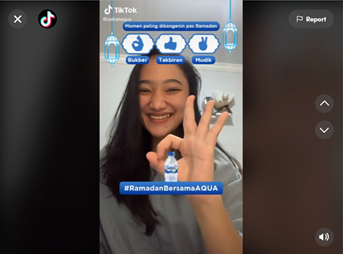
Sharing (usual) Ramadan recipes
This moment is also about creating TikTok content with recipes for iftar, the evening meal that breaks the fast, and suhoor, the pre-dawn meal. This becomes a fun way to exchange culinary ideas and share videos of themselves preparing traditional or their own unique Ramadan recipes.
Usually, the recipes shown to youth are easy and practical recipes for surviving Ramadan, e.g. SASA has a series of DIY easy-to-do recipes for suhoor (midnight breakfast prior to fasting). SASA started as a flavouring product that expanded to become a food company. Its heritage brand image was perceived as old-fashioned, so it tried to rejuvenate itself and target its communication to young people.
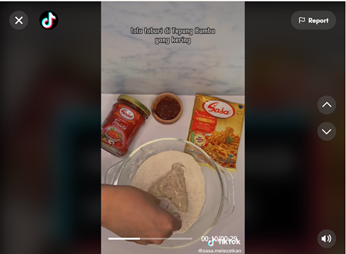
Sharing Ramadan fashion
Some Indonesian Gen Z TikTok users also showcase their fashion choices during Ramadan, including hijabs or modest clothing, which are commonly worn during the holy month. This time is also a time when all youth-targeted brands, including modest/Muslim fashion designers, can strengthen their fashion brands.
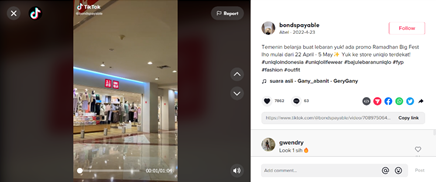
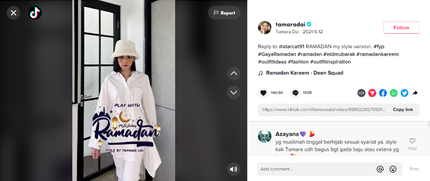
Emphasis on self-improvement
Ramadan is most important as a time for self-reflection, self-discipline and self-improvement. Gen Z in Indonesia are increasingly focused on personal development, wellness and mental health, therefore, Ramadan resonates well with most Gen Z.
The ones who usually capitalise on this topic are publishers, especially Muslim publishers, who are also optimising the use of TikTok to promote their books.
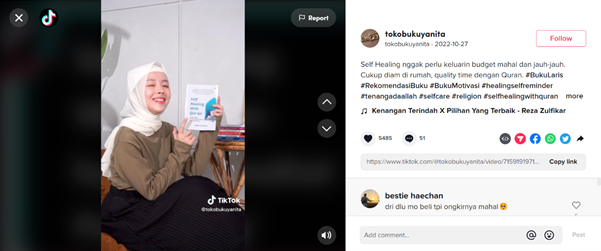
So, are we geared up for this Ramadan and targeting Gen Z?

